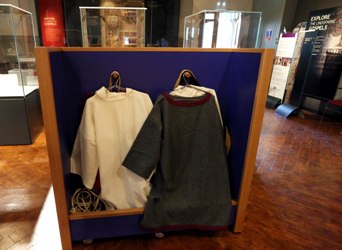‘House of Memories Northern Model’ is a project developed by National Museums Liverpool. Seeking to broker new relationships and develop shared resources between the museum and health care sector, participants are provided with a unique dementia awareness education experience based within a museum setting.
Training and resources such as a free ‘Memory Suitcase’ which contains objects, memorabilia and photos relating to the past to help trigger personal memories, are provided. The project aims to provide the health, social care and housing workforce with practical skills and resources that enable them to support people to live well with dementia.
This project was a roll-out of the original ‘House of Memories’ project and demonstrated that this existing project could successfully transfer, extend and respond to three separate geographic locations, as well as distinct museum and gallery services.
Those participating in the training felt that the project had helped them understand the difference that they can make to people’s lives. The training also helped them to feel confident in trying new approaches with those they help to care for. The creative collaboration between the museum, health care and housing partners has helped to prove that cultural activity has a direct attributable impact upon health and well-being.
‘Stories from the Sea’, is a project developed by the Time and Tide Museum (Norfolk Museums Service), in partnerships with Royal Museums Greenwich, which uses maritime collections and tales to inspire children’s writing skills. Part of the Arts Council England’s Museums and Schools programme, it supports primary schools in raising literacy attainment by inspiring children through the use of world-class local and national maritime collections. Hard to reach children such as disaffected boys and children from areas of low cultural engagement were of particular interest.
Children were encouraged to feel ownership of their local museum with each child making at least 3 visits during the project. 13 local schools were chosen as consultation schools and three new maritime-themed literacy focused events were created and piloted by the schools before being added to the museum’s schools programme. Resource packs, events and CPD days all formed part of the programme.
Evaluation showed that schools visits were up by 30% compared to the previous year and the project has deepened relationships with several local schools. Inspiring and engaging those children who have participated to date has led to an increase in literary attainment.

When the Lindisfarne Gospels returned to the North East in the summer of 2013, for a temporary exhibition, the ‘Lindisfarne Gospels Durham – Learning and Engagement Programme’ was developed. It encompassed a schools programme, an activity programme for children and adults and a scheme to support accredited museums in the region in their efforts to engage with the exhibition.
Launched before the exhibition had opened, in order to work with as many children and young people as possible, the schools programme focused heavily on the making and meaning of the Lindisfarne Gospels and its continuing importance. A talks programme was also developed to reach an older audience with the project team visiting a range of different groups. The scheme to support accredited museums was funded by ACE and allowed those museums who did not have sufficient resources or capacity to run related activities to do so; the scheme covered the cost of training staff and volunteers, the production of support materials and the creation of loan boxes which could be borrowed by museums and schools.
The learning programme met its objectives in terms of numbers and also provided schools with a positive learning experience. The informal learning programme also reported positive feedback. The project also enabled partnerships to be developed with schools, other regional museums and creative practitioners which will provide a long lasting legacy for the programme.
‘Making Your Mark – exploring local heritage for children with Social Emotional and Behavioural Difficulties’, run by English Heritage and Arc School, undertook to inspire learning and emotional wellbeing through heritage experiences at Kenilworth Castle and in the locality of the school.
It is recognised that providing out of classroom heritage education experiences for children with SEBD can cause some nervousness for heritage education staff. The project aimed to highlight to teachers the huge benefits of Heritage Learning for SEBD students. It hoped to enable teachers to make confident and effective use of the historic environment and build the emotional wellbeing of the children they work with.
Visits were carried out to Kenilworth Castle, a local farm, churchyard and war memorial, all geared towards the children’s needs and led by the children’s interests that day. Filming took place both of pre-visit workshops and after the visits with staff giving their thoughts on the process. These two short films are being used not just for training but will be used at conferences and seminars for teachers and heritage professionals.
The experience that the children had was the best heritage engagement that they had been exposed to during their time at the Arc School, due to the time and effort in planning these experiences specifically for their particular needs. Creating a comfortable learning environment became, perhaps, the most valuable outcome of the project and for English Heritage, the project became a tool in which the children’s emotional wellbeing can be enhanced and improved through appropriate engagement.
‘The Future Brunels Programme’ from the ss Great Britain Trust capitalises on the enthusiasm of 11 year olds for science and engineering by providing them with a five year linear programme of inspiring enrichment activities designed to encourage them to focus on the nationally important STEM subjects. Drawing inspiration from the skills and attributes of IK Brunel, the programme aims to provide unique experiences to help participants develop and maintain skills which can help them to become the ‘Brunels’ of the future.
Working closely with four partner schools the team from the ss Great Britain Trust ensures that the programme supports Future Brunels’ development in school as well as outside the classroom during the programme. 12 Future Brunels are selected each year and then spend 6 days throughout the academic year taking part in exclusive activity days, studying things such as the science behind rollercoasters, or the chemistry of dark-room techniques.
Evaluation has shown that Future Brunels are choosing STEM subjects at GSCE as a direct result of the programme, are deciding to stay at school to take ‘A’ Levels rather than going straight to an apprenticeship and are re-evaluating their views on science.
The Trust has benefited in gaining an understanding of the education landscape in Bristol; in building relationships with outside individuals and companies who provide inspiring experiences for Future Brunels and it has encouraged the education team to build an evidence-based education offer informed by current research in the field.
Winners will be announced on 14th May at the Museums + Heritage Awards ceremony. If you’d like to be there you can book your table here.
Back to top




